What Are E-E-A-T in SEO & How to Optimize
On December 15, 2022, Google updated its Search Quality Rater Guidelines (QRG). This update added many new sections and tables, with a total of 11 pages of new content. Compared to before, the most important update is that Google added an E (Experience) on top of EAT, turning EAT into EEAT.
Most Google SEO marketers may have heard of E-A-T before. In this article, we will revisit and discuss E-E-A-T, hoping that seasoned SEO professionals can review and learn something new, while Google SEO beginners need to pay special attention to this topic.
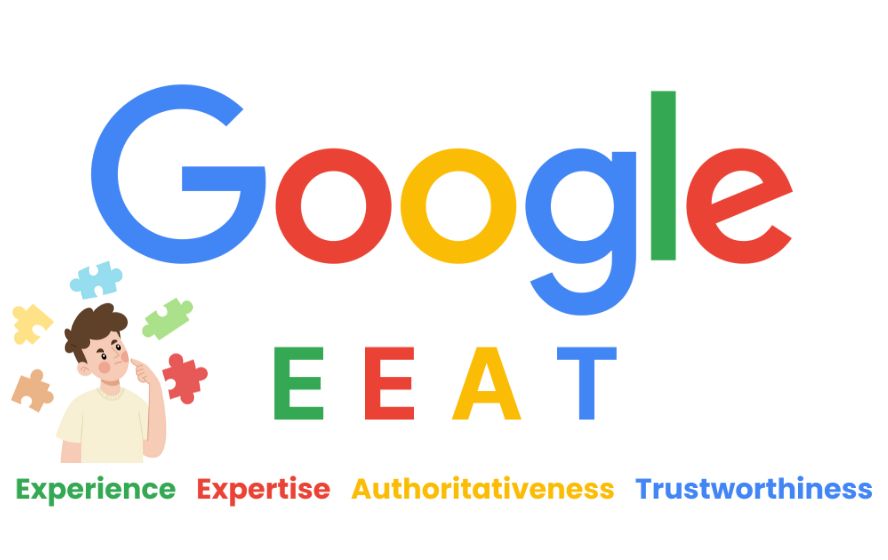
Contents
- What is E-E-A-T?
- How important is E-E-A-T for SEO?
- How to Improve E-E-A-T?
- 1. Establish authoritative backlinks
- 2. Get mentioned more often
- 3. Link to high-quality resources
- 4. Keep content updated
- 5. Provide author information
- 6. Display contact information
- 7. Get more reviews (and respond)
- 8. Collaborate with experts or influential
- 9. Create a Wikipedia page
- 10. Create unique and high-quality content
- Final Words
What is E-E-A-T?
E-A-T is an acronym for Expertise, Authoritativeness, and Trustworthiness. This concept first appeared in the Search Quality Rater Guidelines published by Google in 2014, but E-A-T was not taken seriously by SEO practitioners until around 2018.
In August 2018, Google launched a core algorithm update. This update was also called the EAT update, YMYL update, or Google Medic update by many SEO professionals. After this update, many YMYL (Your Money or Your Life) websites suffered disastrous consequences, and many SEO professionals began to pay attention to E-A-T. You can search for more details about this algorithm update on your own.
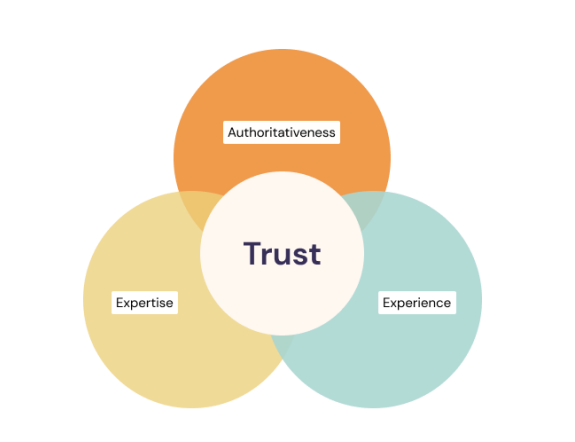
Experience, Expertise, Authority, and Trust, although conceptually similar, are not exactly the same, and Google’s evaluation criteria for the four are different. Essentially, E-E-A-T is a way for Google to try to ensure that it returns accurate, truthful, and useful information to searchers.
Below, we briefly explain the main content of E-E-A-T.
1. Experience
The newly added “Experience” emphasizes the first-hand life experience of the creator in the current topic. For example, if you are looking for a medication guide for fever, you may want to see a professional doctor’s opinion; however, if you are just trying to understand the symptoms of COVID-19 infection, first-hand experience shared by an infected person may be more interesting to you.
2. Expertise
Unlike experience, which is a relatively subjective personal experience sharing, Expertise emphasizes professional knowledge, such as objective, testable knowledge or skills. To determine expertise, search quality raters will review the creator of the main content (MC). Is the author an expert in the subject? Do they have professional knowledge, qualifications, and certifications? Of course, if you don’t have expert qualifications but possess “everyday expertise,” it is sometimes recognized by Google. Google mainly evaluates expertise at the content creator level rather than the website level.
Authority refers to your overall reputation in the industry, particularly among experts and influential people in your field. Simply put, if everyone considers someone or a website as the preferred source of information for a particular topic, then that person or website is authoritative. Unlike expertise, when considering authority, Google search quality raters will review the authority of both the main content creator and the website itself. For example, an article about autonomous driving published by Tesla’s official website and authored by Elon Musk is authoritative because Tesla is an industry leader in autonomous driving. The author – Musk is the founder of Tesla, and various sources confirm that Musk has an in-depth understanding of autonomous driving.
However, authority is relative, and it’s important to remember that. Musk publishing content about autonomous driving on Tesla’s official website is an authoritative information source; but if Musk talks about SEO on Tesla’s official website, there might not be much authority to speak of.
4. Trust
Search quality raters also review the trustworthiness of the main content creator, the main content itself, and the website. Trustworthiness is related to the legitimacy, transparency, accuracy, and security of the website and its content. Google explicitly states that trustworthiness is the most important element in E-E-A-T. If your website lacks trustworthiness, then it becomes meaningless to emphasize experience, expertise, and authority.

How important is E-E-A-T for SEO?
Although E-E-A-T is important for SEO, it is important to clarify that E-E-A-T is not a direct ranking factor. As we mentioned earlier, fundamentally, Google is trying to provide searchers with high-quality, valuable, and trustworthy information or content. If your website demonstrates a high level of E-E-A-T, then it meets Google’s ultimate goal and Google will definitely reflect this in the search results display. Therefore, it is essential to consider these four important factors when executing your SEO strategy.
Overall, E-E-A-T applies to every page, just with varying degrees of importance. Specifically, Google’s E-E-A-T has a significant impact on “Your Money or Your Life” (YMYL) content. YMYL content can affect readers’ happiness, health, financial stability, or personal safety. Common YMYL topics include:
- News and current events: covering topics in international events, business, politics, science, technology, etc. (not all news is YMYL, such as entertainment and sports)
- Civic, government, legal: information related to elections, government agencies, public institutions, social services, or legal advice
- Finance: any financial advice or information related to investments, taxes, retirement plans, loans, banking, or insurance
- Shopping: product research or e-commerce websites involving the purchase of goods or services
- Health and safety: content containing information or advice on health and medical issues, such as hospitals and medications
- Groups: content containing information or claims based on race, nationality, religion, age, gender, sexual orientation, or disability
Depending on the context or the way information is presented, YMYL may include more topics, such as parenting, fitness, nutrition, weight loss, etc. If your website is built around YMYL topics, then demonstrating E-E-A-T is crucial.
How to Improve E-E-A-T?
Considering the importance of E-E-A-T, let’s now talk about how to improve your website’s E-E-A-T. Here are 10 suggestions:
Getting more backlinks from relevant high-authority websites is one of the core effective SEO strategies and one of the best ways to prove you are a trustworthy authority in your industry. To get links, you must consistently create valuable, original, high-quality content that people want to link to.
2. Get mentioned more often
In addition to backlinks, getting mentions from trustworthy sources can improve your E-E-A-T. The more your brand or name appears in authoritative online sources, the more Google will see you as a trustworthy authority.
The biggest challenge is that getting mentioned by authorities is not easy, and you generally need to become an authority yourself to be mentioned by other authorities more often. Nevertheless, we still recommend using two methods to increase the likelihood of being mentioned by authorities:
- Provide unique insights, data, reports, or research on topics within your industry, and proactively contact industry authorities for their reference
- Persistently use platforms like HARO to connect with journalists, providing unique information
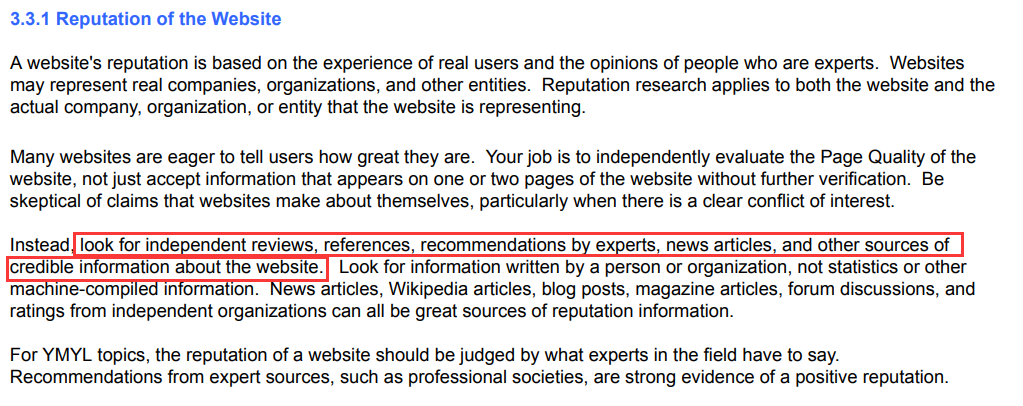
3. Link to high-quality resources
If you want to be seen as an expert, you need to rely on accurate and reliable data. Therefore, during the content creation process, when necessary, you can link to trusted information such as official resources, research results, or papers or reports made by industry professionals to support your views.
4. Keep content updated
Unless the content on your website never changes over time, it’s likely that your pages contain outdated content. If your website’s content covers YMYL topics such as medical or financial advice, keeping the content up-to-date is crucial for improving E-E-A-T.
Even for ordinary topics, we always recommend using the most accurate information to keep all your content up-to-date.
After updating the content, you should display the content update date on the website.
All four aspects of E-E-A-T indicate that Google wants to know who creates the content. Therefore, you should provide relevant author information on your website pages.
If you have a Ph.D., have given speeches at well-known industry conferences, or have received prestigious industry awards, let the world (and Google) know. If you are not yet a well-known expert, you can also add a brief author introduction and link to LinkedIn profiles or other information to further enhance the author and website’s expert status.
There are three prominent places on the website to showcase author information:
(1) The author introduction section of the article page;
(2) The author introduction page of the website;
(3) The team introduction or “About Us” page of the website.
Here is an example of an author bio used by Search Engine Land:
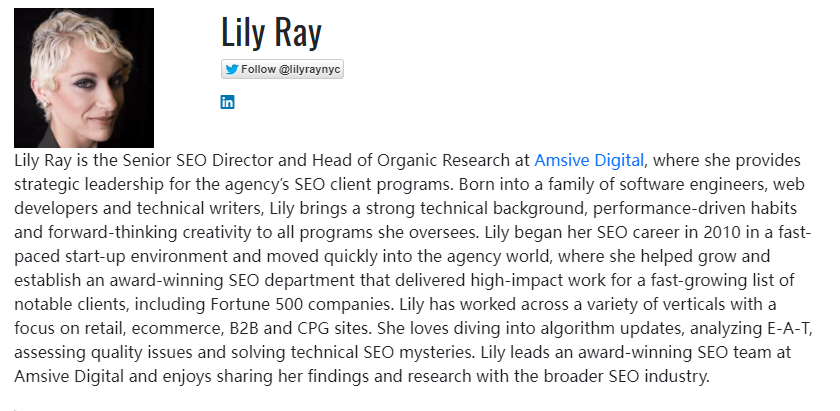
6. Display contact information
Businesses must provide sufficient contact information and customer support to avoid appearing untrustworthy. YMYL pages must pay special attention to this.
Legitimate businesses should at least display their address, phone number, email address, and contact methods.
If you are a personal blogger, this rule may not fully apply to your website. However, I still recommend that you display at least an email contact method.

7. Get more reviews (and respond)
Google explicitly states that quality raters will use online reviews as one of the sources of information for business reputation. Therefore, a large number of positive reviews on various review websites (Google, Trustpilot, Facebook, Yelp, etc.) indicate that your company is trustworthy in the eyes of users, which will help establish your website’s authority and credibility in Google’s eyes.
In addition, when receiving reviews, please take some time to respond to them – especially negative reviews. In fact, responding to user reviews will enhance your credibility as a reputable brand committed to customer satisfaction.
Many brands also display user ratings, reviews, and recommendations on their websites.

8. Collaborate with experts or influential
If you lack expertise on the topics in your field but want to cover them on your website, consider hiring professionals or inviting guest writers to help you.
If you are a small business owner or lack the funds to do so, at the very least, hire capable staff to conduct research and create information-rich, professional content.
9. Create a Wikipedia page
Wikipedia is mentioned several times in the QRG. It’s clear that Google views it as a trusted site.
The catch is that having a Wikipedia page can help enhance your authority, but you can’t get a Wikipedia page unless you’re already seen as an authority!
If you or your website are already experts in your field with extensive coverage from well-known sources but do not yet have a Wikipedia page, you can try creating one (or seek professional services to help). However, if you are a small business, the only thing you can do is see if you can be mentioned on someone else’s Wikipedia page.
10. Create unique and high-quality content
Finally, the most important point is to consistently create high-quality content. Unique and high-quality content written for users (not just for search engines) makes a big difference. To make Google believe you are an expert, you must understand the interests of your target audience and provide valuable information in a reasonable manner.
Here are three points to pay special attention to when creating high-quality content:
- Google emphasizes that high-quality content should have a clear purpose, so it’s important to consider the purpose of your writing.
- Google mentions E-A-T 186 times in its Quality Rater Guidelines, but you may not know that “User Intent” is mentioned 333 times. Therefore, I suggest that you pay special attention to user search intent when creating content.
- Google has gradually increased the importance of original content. In the latest version of the Quality Rater Guidelines, Originality is a new evaluation criterion.
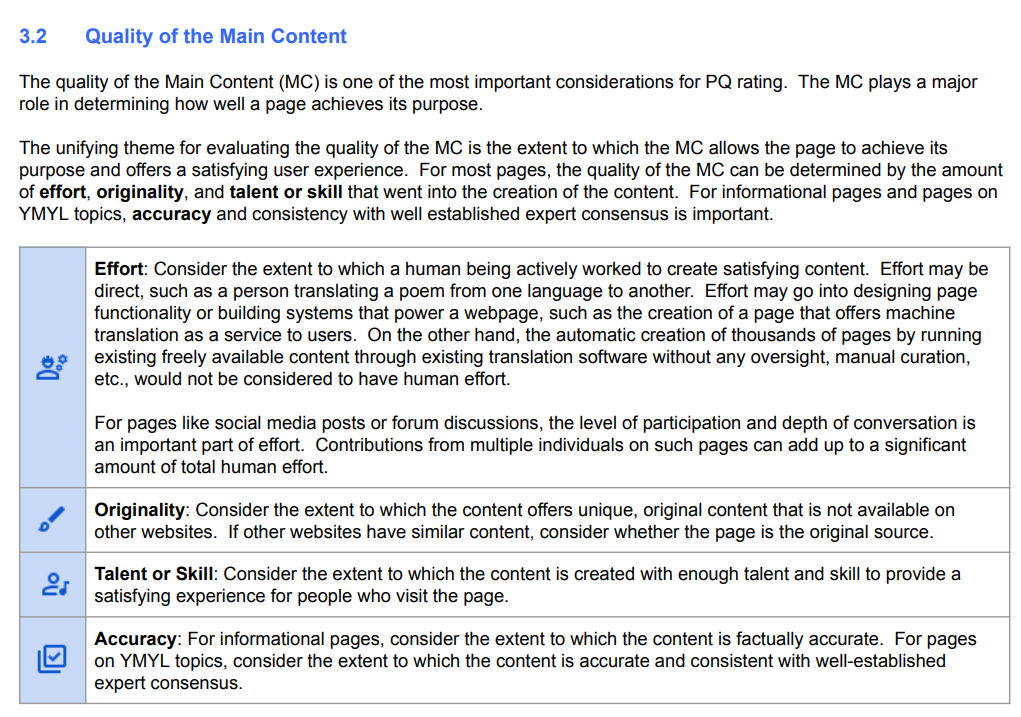
Final Words
For anyone involved in Google SEO, Google’s “Search Quality Rater Guidelines” is an important document, as it tells us how Google judges the quality of our content or websites. If you have time and a good level of English, I recommend reading the guidelines in detail to understand Google’s requirements in terms of content quality, user experience, and website E-E-A-T, and adjust your SEO strategy accordingly.
I firmly believe that the benefits of improving E-E-A-T not only lie in SEO but also in winning long-term trust from users for a website, author, or brand. This can also increase conversion rates and achieve higher revenue goals.
